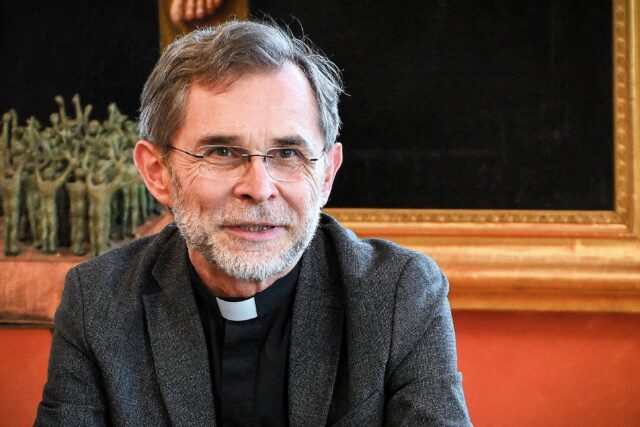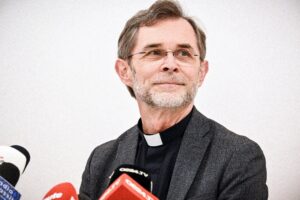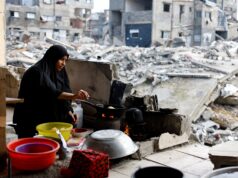
Pope Leo XIV has appointed Father Josef Grünwidl as Vienna’s next archbishop, the Vatican announced Oct. 17.
The 63-year-old Austrian priest, who has served as apostolic administrator for the Archdiocese of Vienna since January, will succeed Cardinal Christoph Schönborn, who has led the archdiocese since 1995.
Cardinal Schönborn had handed in his resignation in 2020 after turning 75, as required by canon law. However, according to the Archdiocese of Vienna, the late Pope Francis had asked the cardinal to remain as archbishop for a time until a suitable successor could be found.
Pope Francis, who died in late April, finally accepted the Austrian cardinal’s resignation in January. Cardinal Schönborn turned 80 Jan. 22.
“We had to wait a long time for a new archbishop, and I share some of the blame,” Archbishop-designate Grünwidl said at an Oct. 17 press conference in Vienna.
The priest said that after feeling overwhelmed by the amount of work when he began his role as apostolic administrator earlier this year, he informed Archbishop Pedro López Quintana, the apostolic nuncio to Austria, that he “couldn’t imagine” leading the archdiocese.
“With that, I thought everything was done for me,” he said, adding that the nuncio or the pope did not accept his hesitance to take the role.
“So many people encouraged me and asked me to say, ‘Yes,'” the archbishop-designate said. “I have great respect for this task, but I have come to the conclusion: God doesn’t want me to be perfect, but available. Therefore, I say ‘yes’ with all my heart.”
“I accept this task with humility and will be part of the diocese’s journey,” Archbishop-designate Grünwidl said. “I want to be a pastor, a team player, and a bridge builder.”
For his part, Cardinal Schönborn told journalists at the press conference: “Now you have heard him and know why I wanted him to become archbishop.”
In a statement reported by Vatican News, Cardinal Schönborn said he was confident the archdiocese was “in good hands,” and noted that in the Eastern churches, “the faithful call out at an ordination: ‘Axios! He is worthy.'”
“It seems to me that people in the church have been saying that about Josef Grünwidl for many weeks and months. How wonderful that Pope Leo has now confirmed it,” the cardinal said.
Born in 1963 in the Austrian town of Hollabrunn, Archbishop-designate Gründwidl was ordained a priest for the Archdiocese of Vienna in 1988. Aside from several pastoral assignments, he also served as personal secretary to then-Archbishop Schönborn from 1995 to 1998.
According to Kathpress, the news agency of the Austrian Catholic Bishops’ Conference, before his priestly ordination, he studied both theology and trained as an organist.
While known for his pastoral approach to ministry, Archbishop-designate Gründwidl was once associated with the controversial “Priests’ Initiative,” a dissident reform group comprised of Austrian priests and deacons.
Founded in 2006 by Father Helmut Schüller, the group gained notoriety in 2011 when it issued a “Call for Disobedience,” which advocated for the ordination of married men as well as women to the priesthood; Communion for divorced and remarried couples as well as non-Catholic Christians; and allowing the laity to preach homilies during Mass.
However, according to the Austrian news agency Vol, Archbishop-designate Gründwidl left the group, noting that Pope Francis had addressed many of the issues raised by the group and his opposition to the use of “disobedience” in its appeal.
However, in a July interview with the German Catholic news agency KNA, the archbishop-designate advocated for church reform, including calling for greater roles for women in the Catholic Church.
“If you look at life in the parishes, you realize that it wouldn’t work without women. I think it’s time to involve women more in decision-making bodies,” he said.
Regarding the ordination of women to the priesthood, the next archbishop of Vienna said the issue of women’s ordination is a “topical issue,” particularly among young people.
“I also realize in conversation, especially with young people, that there is a lack of understanding as to why women are excluded from the priesthood from the outset due to their gender,” he said.

However, in a TV interview broadcast Oct. 5, Archbishop-designate Gründwidl said there was “an urgent need for clarification” regarding the role of women in the church and that the female diaconate should be further discussed.
He also noted that celibacy for priests was “not a matter of faith,” and thus, should not fall as a mandatory requirement, reported ORF, the Austrian public broadcasting service.
Regarding his personal spirituality, Archbishop-designate Gründwidl said his faith must be shown daily, not just in actions but also in deeds and daily encounters with others.
“Whether I am a spiritual person is not shown by whether I am constantly on pilgrimages or spend hours in a chapel, but by my behavior towards other people,” he said.











